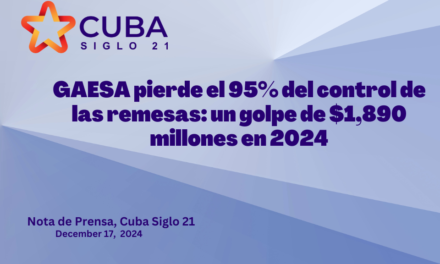Cuba colapsa y también se apaga (pdf español)
Cuba collapses and also dims down (pdf English)
El problema del agua en Cuba (pdf español)
The Water Problem in Cuba (pdf English)
(March 6, 2024) Two independent research, “Cuba collapses and also dims down” by Emilio Morales and “The Water Problem in Cuba“ by the Cuban Observatory of Citizen Audit, shed light on the emergency in the water and energy sectors in the island.
Morales’ report published by Cuba Siglo 21 highlights a growing electricity crisis. After decades of neglect in the modernization of the energy matrix, the Electrical Union (EU) faces a deficit of 31.1% between supply and demand for electricity, this figure could be even higher in the coming weeks. Obsolete infrastructure and lack of investment have left people suffering from increasingly frequent and prolonged power outages. Morales emphasizes that the energy crisis has no immediate solution. To resolve this crisis, multimillion-dollar investments are required (estimated at $10 billion) and it will take 6 to 8 years to rebuild the thermoelectric generation capacity. The real solution lies in changing the current economic model. The only way for the Cuban economy to rebuild is to eliminate the internal blockade of prohibitions and regulations that prevents citizens from generating wealth and drives away foreign investors.
On the other hand, the report from the Cuban Citizen Audit Observatory highlights the water supply crisis on the island. Despite having extensive reservoir systems, more than 67% of the Cuban population does not receive stable water in their homes. Almost 2 million Cubans (1,884,000) do not have access to drinking water, although the government only recognizes less than 1 million (956,000). The lack of maintenance of the infrastructure, the poor management of water resources and the prioritization of tourism over the basic needs of the population when guaranteeing the supply of the precious liquid, aggravate the situation.
Both reports agree on the urgent need to address the structural problems that affect Cuba. The water and energy crisis not only impacts the quality of life of millions of Cubans, but also has serious implications for public health and the environment.
To resolve these crises, a systemic change in the country’s economic and management model is required. In his research, Morales emphasizes the importance of moving from a centralized and state centered model to a free-market economy that stimulates foreign investment and innovation. “A profound internal structural reform must be implemented that truly liberates the country’s productive forces, under a legal regulatory framework that guarantees, protects and stimulates productive development based on private property,” says Morales. For its part, the Cuban Observatory of Citizen Audit also demands structural changes that allow attracting resources to rescue the distribution network, comply with the citizen’s right of access to drinking water, as well as lead to transparent and efficient of hydraulic resources.
In summary, to successfully address the solution to both crises, it is essential to implement immediate structural and systemic changes.
Cuba colapsa y también se apaga (pdf español)
Cuba collapses and also dims down (pdf English)
El problema del agua en Cuba (pdf español)
The Water Problem in Cuba (pdf English)







